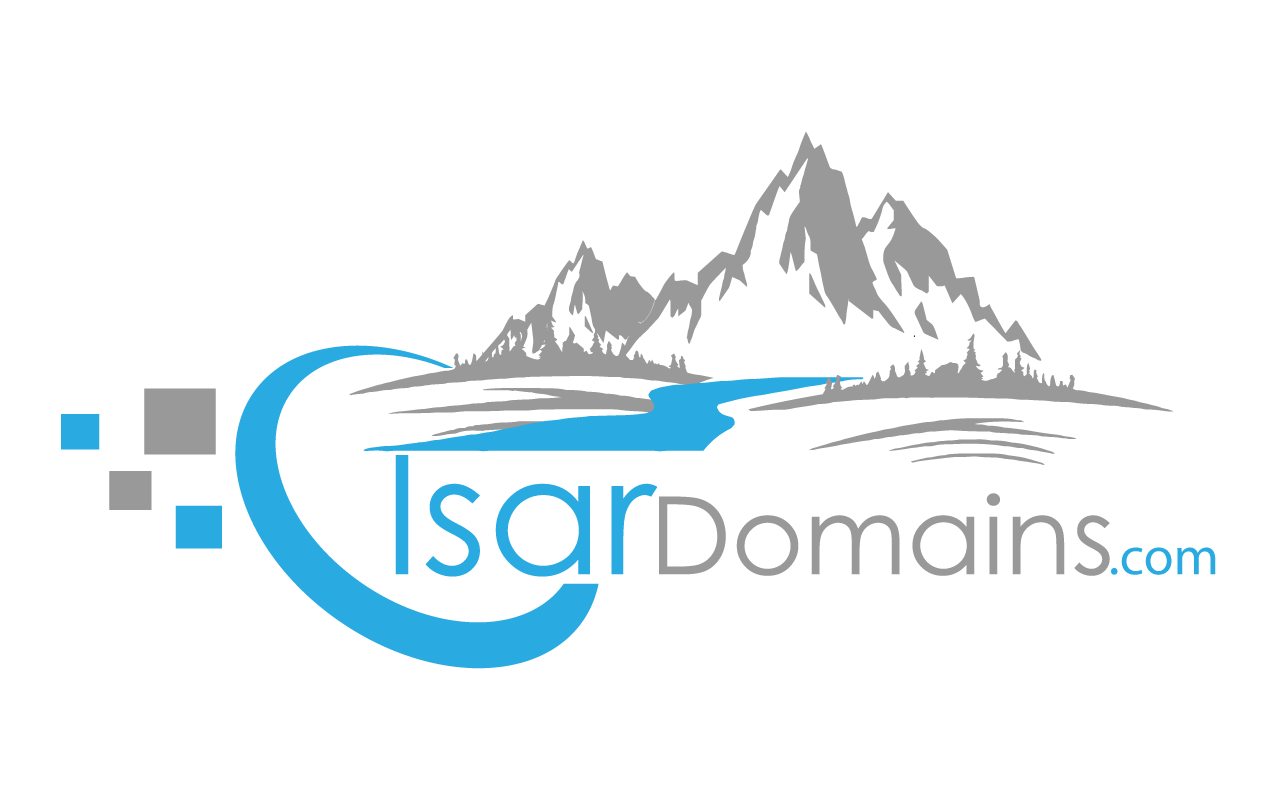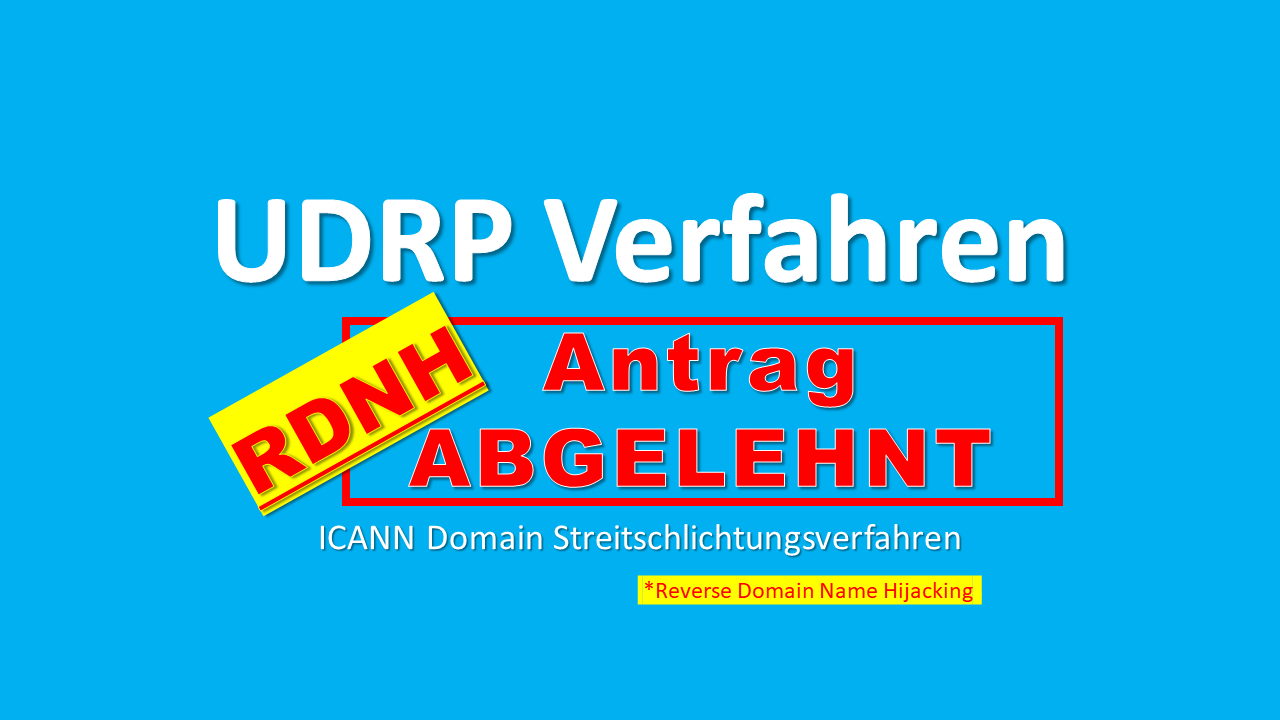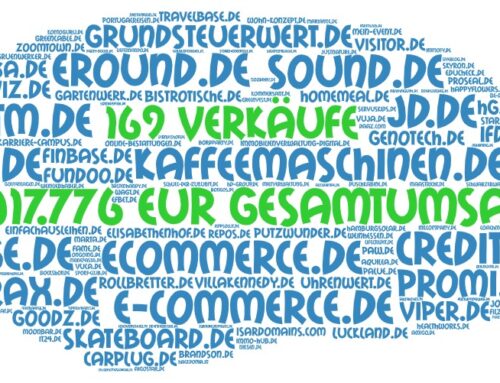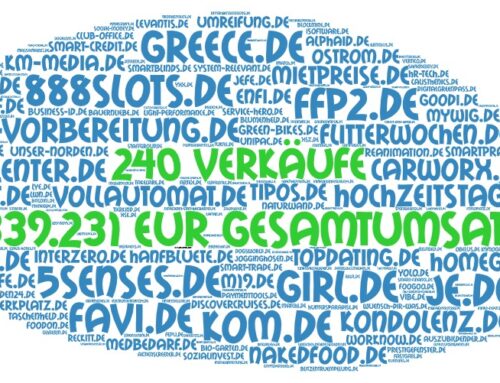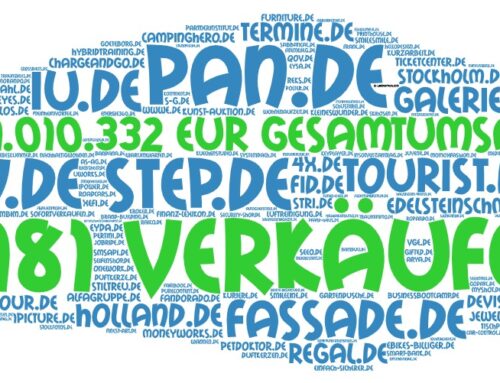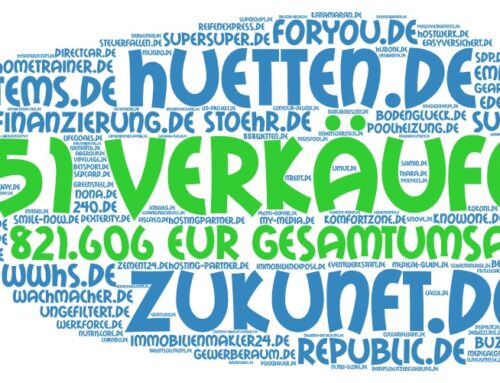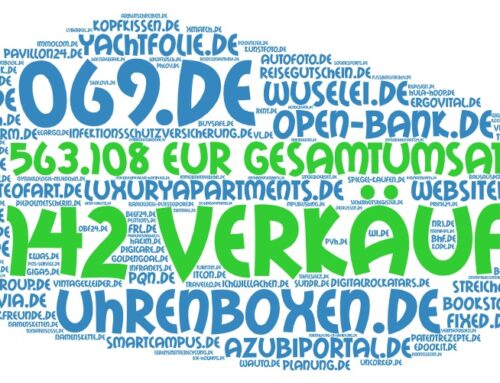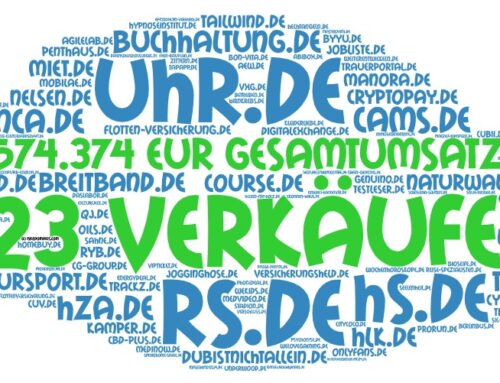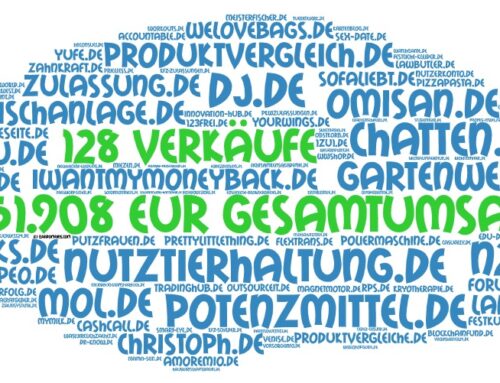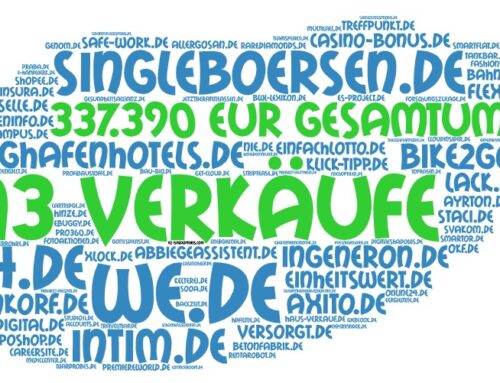Das von der HAHN Kunststoffe GmbH beantragte Domain-Streitschlichtungsverfahren (kurz URDP = Uniform Domain-Name Dispute-Resolution Policy) hinsichtlich der Domain HANIT.com wurde von der World Intellectual Property Organization (WIPO) mit „Reverse Domain Name Hijacking“ Verdacht abgelehnt. HANIT.com bleibt somit beim jetzigen Eigentümer (in Korea) – trotz des eingetragenen Markenrechtes (DE/WO/EUTM) an der Wortmarke „hanit“ der hessischen Firma.
Der Plan ist nach hinten losgegangen. In einem von der HAHN Kunststoffe GmbH eingeleiteten Domain–Streitschlichtungsverfahren (UDRP) hinsichtlich der Domain HANIT(.)com, lehnte die Weltorganisation für geistiges Eigentum (WIPO) den Antrag der hessischen Firma ab. Der Antrag wurde sogar mit dem Verdacht auf „Reverse Domain Name Hijacking“ (RDNH )abgelehnt. Das kommt nicht alle Tage vor, zumal die Firma die Wortmarke „HANIT“ im Jahr 1998 beim Deutschen Patent- und Markenamt #DPMA eintragen lassen hat. Im Laufe der Jahre sicherte sie sich ebenfalls die europäische Unionsmarke sowie die internationale Marke an dem Namen. Die Domain HANIT(.)com wurde erstmals im Jahr 2001 registriert (seitdem in Besitz des selben Eigentümers). Knapp 3 Jahre nach dem ersten Markeneintrag war die Domain also noch frei verfügbar und erst ganze 18 Jahre (!) später, nämlich im Jahr 2016, schien die HAHN Kunststoffe GmbH erstmals überhaupt an der Domain interessiert. Der Preis betrug damals 20,000 US-Dollar – es kam aber kein Kaufvertrag zustande. Zwei weitere Jahre später, im Januar 2018, erwog die Firma erneut, die Domain zu kaufen. Allerdings hat sich der Preis mittlerweile verdreifacht. Der Domaininhaber setzte nun einen Preis von 68,000 US-Dollar an.
HAHN Kunststoffe GmbH reichte daraufhin bei der WIPO einen Antrag auf Domain-Streitschlichtung ein. In der Antragsbegründung unterstellten die beauftragten Anwälte dem Inhaber, die Domain als „professioneller Cybersquatter“ bösgläubig registriert zu haben um sie zu einem utopisch hohen Preis dem Markenrechtsinhaber zu verkaufen. Der Domaininhaber konnte aber dem Entscheidungs-Gremium den Preis von 68,000 US-Dollar glaubhaft belegen: Er verkaufte in dem Zeitraum nämlich eine andere, vergleichbare Domain aus seinem Portfolio – zu einem Preis von 74,000 US-Dollar. Damit gibt es einen nachweislichen Beleg, welche den aufgerufenen Preis rechtfertigt. Weiterhin stellte das Gremium fest, dass es ja HAHN Kunststoffe GmbH war, die initial auf den Inhaber zuging um die Domain zu erwerben, nicht umgekehrt. Damit wurde die Aussage entkräftet, dass der Inhaber die Domain bösgläubig registriert hat um sie zu einem utopischen Preis an den Markeninhaber zu verkaufen. Zudem wurde in der Entscheidung berücksichtigt, dass es die Firma versäumte, nach Eintragung ihrer Marken, den betroffenen Domainnamen zu registrieren. Es kam so bei den Mitgliedern des Gremiums der Verdacht auf, dass die Firma sich mittels UDRP Antrag den Namen einverleiben möchte, da ihr der Verkaufspreis zu hoch scheint. Ein hoher Kaufpreis einer Domain rechtfertigt aber kein UDRP-Verfahren im Sinne der WIPO Regeln bzgl. geistigen Eigentums. Ein UDRP-Verfahren ist keine Alternative zu falsch- oder nicht getroffenen Geschäftsentscheidungen, so das Schlusswort! Unter anderem aus diesen Gründen wurde der Antrag mit dem Verdacht „Reverse Domain Name Hijacking“ abgelehnt.
Zum Nachlesen gibts die komplette Entscheidung unter dem Aktenzeichen D2018-1433 bzw. nachfolgend als Kopie:
HAHN Kunststoffe GmbH reichte daraufhin bei der WIPO einen Antrag auf Domain-Streitschlichtung ein. In der Antragsbegründung unterstellten die beauftragten Anwälte dem Inhaber, die Domain als „professioneller Cybersquatter“ bösgläubig registriert zu haben um sie zu einem utopisch hohen Preis dem Markenrechtsinhaber zu verkaufen. Der Domaininhaber konnte aber dem Entscheidungs-Gremium den Preis von 68,000 US-Dollar glaubhaft belegen: Er verkaufte in dem Zeitraum nämlich eine andere, vergleichbare Domain aus seinem Portfolio – zu einem Preis von 74,000 US-Dollar. Damit gibt es einen nachweislichen Beleg, welche den aufgerufenen Preis rechtfertigt. Weiterhin stellte das Gremium fest, dass es ja HAHN Kunststoffe GmbH war, die initial auf den Inhaber zuging um die Domain zu erwerben, nicht umgekehrt. Damit wurde die Aussage entkräftet, dass der Inhaber die Domain bösgläubig registriert hat um sie zu einem utopischen Preis an den Markeninhaber zu verkaufen. Zudem wurde in der Entscheidung berücksichtigt, dass es die Firma versäumte, nach Eintragung ihrer Marken, den betroffenen Domainnamen zu registrieren. Es kam so bei den Mitgliedern des Gremiums der Verdacht auf, dass die Firma sich mittels UDRP Antrag den Namen einverleiben möchte, da ihr der Verkaufspreis zu hoch scheint. Ein hoher Kaufpreis einer Domain rechtfertigt aber kein UDRP-Verfahren im Sinne der WIPO Regeln bzgl. geistigen Eigentums. Ein UDRP-Verfahren ist keine Alternative zu falsch- oder nicht getroffenen Geschäftsentscheidungen, so das Schlusswort! Unter anderem aus diesen Gründen wurde der Antrag mit dem Verdacht „Reverse Domain Name Hijacking“ abgelehnt.
Zum Nachlesen gibts die komplette Entscheidung unter dem Aktenzeichen D2018-1433 bzw. nachfolgend als Kopie:
WIPO Arbitration and Mediation Center ADMINISTRATIVE PANEL DECISION HAHN Kunststoffe GmbH v. Privacydotlink Customer 1013312 / Kwangpyo Kim, Mediablue Inc Case No. D2018-1433 1. The Parties The Complainant is HAHN Kunststoffe GmbH of Hahn Flughafen, Germany, represented by Sorbara, Schumacher, McCann LLP, Canada. The Respondent is Privacydotlink Customer 1013312 of Grand Cayman, Overseas Territory of the United Kingdom of Great Britain and Northern Ireland (“UK”) / Kwangpyo Kim, Mediablue Inc of Gwang-Ju, Republic of Korea (“Korea”), represented by ESQwire.com PC, United States of America (“United States”). 2. The Domain Name and Registrar The disputed domain name (the “Domain Name”) is registered with Uniregistrar Corp (the “Registrar”). 3. Procedural History The Complaint was filed with the WIPO Arbitration and Mediation Center (the “Center”) on June 28, 2018. On June 28, 2018, the Center transmitted by email to the Registrar a request for registrar verification in connection with the Domain Name. On June 29, 2018, the Registrar transmitted by email to the Center its verification response disclosing registrant and contact information for the Domain Name which differed from the named Respondent and contact information in the Complaint. The Center sent an email communication to the Complainant on July 3, 2018, providing the registrant and contact information disclosed by the Registrar, and inviting the Complainant to submit an amendment to the Complaint. The Complainant filed an amended Complaint on July 5, 2018. The Center verified that the Complaint together with the amended Complaint satisfied the formal requirements of the Uniform Domain Name Dispute Resolution Policy (the “Policy” or “UDRP”), the Rules for Uniform Domain Name Dispute Resolution Policy (the “Rules”), and the WIPO Supplemental Rules for Uniform Domain Name Dispute Resolution Policy (the “Supplemental Rules”). In accordance with the Rules, paragraphs 2 and 4, the Center formally notified the Respondent of the Complaint, and the proceedings commenced on July 11, 2018. In accordance with the Rules, paragraph 5, the due date for Response was July 31, 2018. In accordance with the Rules, paragraph 5(b), the due date for Response was automatically extended to August 4, 2018, upon request of the Respondent. The Response was filed with the Center August 3, 2018. The Center appointed W. Scott Blackmer, Enrique Ochoa and The Hon. Neil Brown Q.C. as panelists in this matter on September 11, 2018. The Panel finds that it was properly constituted. Each member of the Panel has submitted the Statement of Acceptance and Declaration of Impartiality and Independence, as required by the Center to ensure compliance with the Rules, paragraph 7. 4. Factual Background The Complainant is a German limited liability company (GmbH) headquartered in Hahn, in the state of Rhein-Palatinate, Germany. The Complaint and the Complainant’s website at “www.hahnkunststoffe.de” indicate that the company recycles plastics, producing since 1993 a high-tech plastic product branded as HANIT, which is used in a variety of manufacturing applications. The Complainant has four locations in Germany and also branches in France, the UK, and Canada. The Complainant’s website is published with pages in German, English, French, and Spanish. According to the Complaint, “Hanit is well known in the specialized markets in Europe, England, and North America”. The Complainant holds a German registered trademark for HANIT as a word mark, Trademark Registration Number DE 39837111 (registered December 3, 1998). This was the basis for subsequently obtaining International Trademark Number WO 903284 (registered November 9, 2005) and European Union Trade Mark Number EUTM 004707287 (registered November 27, 2006). According to the Registrar, the Domain Name was created on May 20, 2001 in the name of the Respondent domain privacy service. After notification of this dispute, the Registrar terminated the privacy service and identified the registrant as the Respondent Kwangpyo Kim and the registrant’s organization as Mediablue Inc, with a postal address in Gwang-Ju, Republic of Korea. It appears that the Domain Name has been used only to resolve to a landing page advertising the availability of the Domain Name for purchase and featuring third-party pay-per-click (“PPC”) advertising links for a variety of products and services, such as those relating to weight loss, face care, and dating advice. At the time of this Decision, the following message is posted at the bottom of the landing page: “The Sponsored Listings displayed above are served automatically by a third party. Neither the service provider nor the domain owner maintain any relationship with the advertisers. In case of trademark issues please contact the domain owner directly (contact information can be found in whois)”. The Complainant reports that in 2016 it inquired about acquiring the Domain Name from Uniregistry Market, which offered to sell it for USD 20,000. In February 2018, the Complainant again inquired about purchasing the Domain Name, and “Kim James” replied, offering to sell the Domain Name for USD 68,000 and then for USD 60,000, attaching for comparison a screenshot from “www.escrow.com” showing the recent sale of another domain name by “Kwan pyo Kim” (with the same email address as “Kim James”) for USD 74,980. Copies of these communications are attached to the Complaint. A Response was submitted by MediaBlue, Inc., attaching a Declaration by its owner and representative Kwang Pyo Kim, hereafter referred to collectively as the “Respondent”. The Declaration states that Mr. Kim is in the business of “domain investing” and has, since 2001, registered “hundreds of common word domain and combined letter domain names for investment and development”. The Declaration explains that “generic and descriptive common word and 3, and 4 letter, and first and last domain names” are easy to remember, serve well as online identifiers, and are, therefore, commercially valuable. Mr. Kim’s Declaration goes on to say that underdeveloped domain names are parked with domain parking services that pay a share of the advertising revenues they generate, “an industry-wide accepted practice”. The Response includes a score of examples of other domain names registered by the Respondent based on common words or short strings of letters, which do not obviously mimic trademarks. The Declaration states that the Respondent registered the Domain Name in May 2001 because it “had value as a short memorable name” and has since parked it with “many different parking services” over the past decade that have displayed PPC advertising links. 5. Parties’ Contentions A. Complainant The Complainant asserts that the Domain Name is identical to its HANIT trademark and that the Respondent has no rights or legitimate interests in the Domain Name but has only tried to sell it. The Complainant infers that the Respondent acquired the Domain Name in bad faith, with the intent to sell it to the trademark holder for an exorbitant price. The Complainant further accuses the Respondent of being a “professional cybersquatter”, citing the Policy, paragraph 4(b)(ii), which concerns a pattern of preventing trademark holders from registering corresponding domain names. B. Respondent The Respondent does not challenge the Complainant’s German trademark but observes that the International and European Union trademarks were obtained years after the Domain Name was registered. The Respondent denies any prior knowledge of the Complainant. Mr. Kim’s Declaration states that the Respondent has operated only in the Republic of Korea and that the Respondent had no knowledge of the Complainant, its business, its mark, or its website when the Respondent registered the Domain Name in May 2001 through Mr. Kim’s consulting company, a predecessor of MediaBlue, Inc. The Respondent denies any intent to target the Complainant’s mark and claims a legitimate interest in registering a short, memorable string, as it has on many other occasions, for the purposes of domain investment and PPC advertising. The Respondent suggests that the Complainant “slept on its rights” for seventeen years and only filed a UDRP proceeding as a “Plan B” when it decided to acquire a corresponding “.com” domain name and failed to obtain it for a satisfactory price. 6. Discussion and Findings Paragraph 4(a) of the Policy provides that in order to divest a respondent of a disputed domain name, a complainant must demonstrate each of the following: (i) the disputed domain name is identical or confusingly similar to a trademark or service mark in which the complainant has rights; and (ii) the respondent has no rights or legitimate interests in respect of the disputed domain name; and (iii) the disputed domain name has been registered and is being used in bad faith. Under paragraph 15(a) of the Rules, “A Panel shall decide a complaint on the basis of the statements and documents submitted and in accordance with the Policy, these Rules and any rules and principles of law that it deems applicable.” A. Identical or Confusingly Similar The Complainant indisputably holds a registered HANIT trademark. The Domain Name incorporates that mark in its entirety. As in most cases, the generic Top-Level Domain (“gTLD”) “.com” is not a distinguishing feature. See WIPO Overview 3.0, section 1.11. The first element of a UDRP complaint “functions primarily as a standing requirement” and entails “a straightforward comparison between the complainant’s trademark and the disputed domain name”. See WIPO Overview 3.0, section 1.7. The Panel concludes under this test that the Domain Name is confusingly similar for purposes of the first element of the Policy. B. Rights or Legitimate Interests Paragraph 4(c) of the Policy gives non-exclusive examples of instances in which the Respondent may establish rights or legitimate interests in the Domain Name, by demonstrating any of the following: (i) before any notice to it of the dispute, the Respondent’s use of, or demonstrable preparations to use, the Domain Name or a name corresponding to the Domain Name in connection with a bona fide offering of goods or services; or (ii) that the Respondent has been commonly known by the Domain Name, even if it has acquired no trademark or service mark rights; or (iii) the Respondent is making a legitimate noncommercial or fair use of the Domain Name, without intent for commercial gain to misleadingly divert consumers or to tarnish the trademark or service mark at issue. The Panel notes that the use of the Domain Name for PPC advertising links unrelated to any claimed generic value of the Domain Name confers no rights or legitimate interests on the Respondent (see WIPO Overview 3.0, section 2.10.1). However, the Respondent, a domain investor or “domainer”, can legitimately speculate in the purchase and sale of domain names that have potential value for website development, email, mobile applications, or other lawful uses. The record shows that the Respondent has been in the business of domain investment for many years, registering numerous short strings as domain names because a purchaser might find them valuable for their generic sense or because they are “brandable”, meaning that they could be turned into a brand without infringing on the trademark of another. This could represent a legitimate interest in the Domain Name for purposes of the second element of the Policy, so long as the evidence did not point instead to an underlying intent to exploit the Complainant’s trademark. That issue implicates essentially the same facts that are considered in connection with the element of bad faith and, therefore, is discussed more fully below. C. Registered and Used in Bad Faith The Policy, paragraph 4(b), furnishes a non-exhaustive list of circumstances that “shall be evidence of the registration and use of a domain name in bad faith”, including the following (in which “you” refers to the registrant of the domain name): (i) circumstances indicating that you have registered or you have acquired the domain name primarily for the purpose of selling, renting, or otherwise transferring the domain name registration to the complainant who is the owner of the trademark or service mark or to a competitor of that complainant, for valuable consideration in excess of your documented out-of-pocket costs directly related to the domain name; or (ii) you have registered the domain name in order to prevent the owner of the trademark or service mark from reflecting the mark in a corresponding domain name, provided that you have engaged in a pattern of such conduct; or (iv) by using the domain name, you have intentionally attempted to attract, for commercial gain, Internet users to your web site or other on-line location, by creating a likelihood of confusion with the complainant’s mark as to the source, sponsorship, affiliation, or endorsement of your web site or location or of a product or service on your web site or location. The Complaint refers to the first and second examples above, and the last may be implied when the registrant allows a domain name to be used for PPC advertising, as an instance of attracting Internet users to another site for commercial gain. The weakness in the Complainant’s argument, however, is the improbability that the Korean Respondent was aware of the German Complainant and its plastic recycling product in 2001, when the Domain Name was registered. The Complainant had only a German trademark and little or no business in Asia at that time. It does not appear that it was engaged in consumer markets, and it had no “.com” website but only a website in the “.de” country code Top-Level Domain (“ccTLD”). The Respondent denies any prior knowledge of the Complainant, and the denial is plausible on these facts. The Respondent then held the Domain Name for fifteen years without contacting the Complainant; it was the Complainant that finally initiated communications. These facts, along with the unlikelihood that the Respondent was even aware of the Complainant, are inconsistent with the notion that the Respondent acquired the Domain Name primarily for the purpose of selling it to the Complainant. The Complainant also asserts that the Respondent is a cybersquatter guilty of a pattern of registering domain names to prevent trademark holders from obtaining corresponding domain names, but the Complainant offers no proof in support of this allegation. Rather, the record shows that the Respondent registers and speculates in numerous short strings as domain names, but not that they are based on the trademarks of others. Finally, there is no evidence that the PPC advertising associated with the Domain Name has ever linked to the Complainant or its competitors (although that is obviously a risk that the Respondent should take care to avoid). Thus, the record is entirely lacking in evidence of any intent to exploit the Complainant’s trademark. The Panel finds, therefore, that the Complaint fails on both the second and third elements. D. Reverse Domain Name Hijacking Paragraph 15(e) of the UDRP Rules provides that, if “after considering the submissions the panel finds that the complaint was brought in bad faith, for example in an attempt at Reverse Domain Name Hijacking (“RDNH”) or was brought primarily to harass the domain-name holder, the panel shall declare in its decision that the complaint was brought in bad faith and constitutes an abuse of the administrative proceeding”. Thus, although the Respondent did not request a finding of Reverse Domain Name Hijacking, the Panel finds it appropriate to consider whether such a declaration is warranted in this case. Reverse Domain Name Hijacking is defined under the UDRP Rules as “using the UDRP in bad faith to attempt to deprive a registered domain-name holder of a domain name”. Mere lack of success of a complaint is not sufficient to find Reverse Domain Name Hijacking. See WIPO Overview 3.0, section 4.16. But a finding of RDNH is compelling, for example, when a panel finds that the complainant (especially one represented by counsel) should have recognized that it could not succeed on one of the three elements of the complaint under any fair interpretation of the available facts or brings a complaint based “on only the barest of allegations without any supporting evidence” (id.). The Complainant’s allegations with respect to bad faith are of such a character, as detailed above. Indeed, the Complaint does appear to reflect, as the Respondent concluded, the Complainant’s “Plan B” after failing to register a domain name corresponding to its brand at some point after 1993 and determining not to purchase the Domain Name when it encountered a high price in 2016 and a higher one in 2018. The Panel does not countenance abuse of the UDRP system as an alternative to dealing with the consequences of business decisions. Accordingly, the Panel finds that the filing of the Complaint in this proceeding represents an attempt at Reverse Domain Name Hijacking. 7. Decision For the foregoing reasons, the Complaint is denied. W. Scott Blackmer Presiding Panelist Enrique Ochoa Panelist The Hon Neil Brown Q.C. Panelist Date: September 25, 2018
